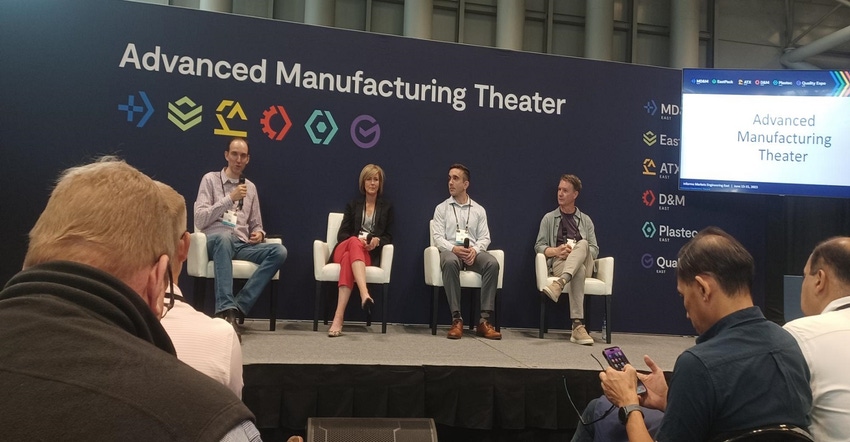Can ChatGPT Empower Manufacturing Workers?
IME East panelists believe generative AI can help workers build a knowledge base that makes them the go-to experts when problems arise.

Manufacturing workers who retire or leave their jobs often leave behind invaluable knowledge on plant tasks and procedures. While some larger plants may have this information well documented, that is not often the case in smaller plants, leaving newer workers to scramble to reassemble that knowledge base.
At an IME East Conference and Exhibition in June titled, "Harnessing ChatGPT: Bridging the Knowledge Gap in Manufacturing," several panelists said generative AI programs such as ChatGPT could become the missing link to establishing essential how-to and best practices for various manufacturing tasks.
Maintaining Quality Long a Challenge
Maintaining manufacturing quality has long been a challenge for manufacturers of all sizes, noted Catherine Briley, Director of Manufacturing 4.0 Integration at the Cooley Group. “The problems existed before COVID, and with new products and new processes there is a loss of tribal knowledge and information. In some cases, there is an absence of digital knowledge and stored information to solve production issues.”
These issues become exacerbated when older workers retire, leaving those behind to figure out what is going on. Generative AI programs such as ChatGPT can be queried to produce at least a baseline of manufacturing guidelines and answers that workers can start with.
Martin Cloake, CEO at Raven.ai and co-founder of the Industry 4.0 club, said progams such as ChatGPT can help produce useful training documents that can be enhanced with inputs from operators. In addition, the program can help operators clarify existing documents to get answers. “ChatGPT can be used to query internal documents, such as process documents,” Cloake added.
Because many companies have several manufacturing plants, generative AI can also help ensure that manufacturing information and procedures are consistent in various locations and spare workers time spent having to get information from other locations should a manufacturing issue arise suddenly.
Justin Brennan, Vice President of Operations for Medical Laboratories, added that ChatGPT can provide reference or training documents for workers in remote or distributed locations. “Empowering people on front line can make a difference in productivity and engagement.”
Easier Access to Documents
Catherine Briley of the Cooley Group noted that in some firms internal manufacturing documents may be in Sharepoint or another network location that frontline production workers may not be able to easily access. “ChatGPT can potentially make such information easier to find,” she said.
One question asked of the panelists was how AI would fit in with the lean manufacturing vs Industry 4.0 manufacturing philosophies. Lean manufacturing methods rely heavily on interactions between humans, while 4.0 makes heavy use of digital data and analytics.
Raven’s Martin Cloake responded by stating that ChatGPT’s emphasis on language makes it ideal for operators who may not be trained in data and analytics. ”ChatGPT relies on language, it can work through texting. ChatGPT has the ability to work at scale.”
Cloake added, “Manufacturers have a lot of wisdom in their organizations. Tap into their information and insights, and not just digital data.”
About the Author(s)
You May Also Like


.jpg?width=300&auto=webp&quality=80&disable=upscale)


